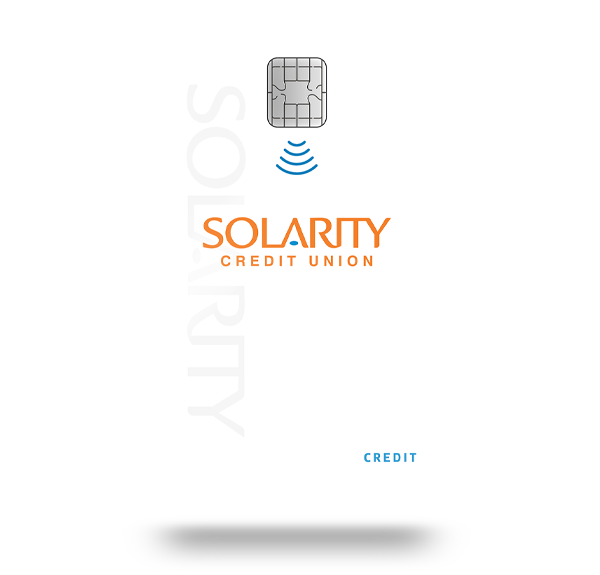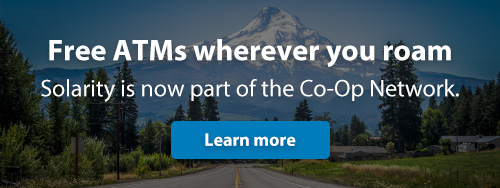Credit cards that fit your life
Solarity Visa® puts the power of payment versatility in your hands. Whether you’re on a trip to Greece or a trip to the grocery store, enjoy quick, convenient access to your available credit limit, no annual fee, no cash advance fee and local servicing.*
![]()
Platinum Visa
Convenient, easy-to-use line of credit
![]()
Share Secured Visa
Ideal for establishing or rebuilding credit
![]()
Student Visa
For members ages 15-20

Reasons to love our credit cards
- No annual fee and no balance transfer fee
- No minimum interest charge
- No cash advance fee and the same rate as purchases
- Visa Account Updater (VAU) to keep transactions seamless
- Visa Secure for peace of mind while shopping online
- Near real-time fraud notifications with Visa Purchase Alerts
- Cash advances at more than 30,000 surcharge-free ATMs nationwide
Credit cards for every type of borrower
Whether you have a long credit history or are looking for a fresh start, we have credit cards to give you the spending flexibility you need.

Platinum Visa
Looking for a straightforward line of credit with a great low rate? Our easy-to-use Platinum Visa card gives you the power to make your next purchase, travel without worry or transfer existing balances from higher rate cards.

Share Secured Visa
If you’re establishing or rebuilding your credit—this is the card for you. To ensure a low rate, secured cards use a security deposit as cash collateral. With the same great features as the Platinum Visa, our Share Secured Visa can help you start improving your credit history.

Student Visa
This card is perfect for younger members who want to establish a positive credit history and learn good money habits. With the same rates and terms as our Platinum Visa, students ages 15–20 are eligible to apply (with an adult co-signer at least 21 years old).

Visa Secure and Visa Account Updater
Visa Secure
Visa Secure (formerly Verified by Visa) simply means you get access to an added layer of protection, keeping your money safer while you are shopping online. When making a purchase from a merchant participating in Visa
Secure, you may be guided through an extra step to confirm your identity. No need to do anything on your part other than follow the prompts. Visa Secure does the work to ensure it’s an authorized transaction.
Visa Account Updater
Visa Account Updater (VAU) automatically sends cardholder data to participant merchants when the card information is updated. It offers a seamless account update process without the need for direct action on
your part. For example, if your phone bill automatically charges to your credit card every month, without the VAU, you would need to update your card info yourself in the event of a new card. With VAU, Visa will send the updated card info to that
merchant for you.
If you do not wish to have your card information automatically sent to participant merchants in the event of a new card, you can opt out by calling 800.347.9222.
Please note: you must opt out before your old card has expired, or within 24 hours of ordering a new card when the old card is lost or stolen.
You might also like:

Home Loans
Whether you're buying, refinancing or just starting to shop for houses, we have loans for every type of home owner.
Explore home loans
RV Loans
Upgrade your next camping adventure! Financing for motor homes, travel trailers, fifth wheels and campers.
Let's go
Home Equity
Tap into the buying power of your home to pay for large expenses or consolidate debt.
Find out moreCommon questions about credit cards
To activate your Solarity debit or credit card, call 833.233.1603 and follow the automated prompts. If you run into any issues or prefer in-person assistance, feel free to stop by your nearest Solarity branch. We're happy to help!
Visa Purchase Alerts is an easy-to-use tool that helps members track spending and identify fraudulent activity early. Customize your alerts by choosing which debit or credit card transactions should trigger a notification and receive near real-time updates via text or email.
It only takes three steps to enroll in Visa Purchase Alerts:
1. Check to see if your Visa account is eligible.
2. Register your mobile device and/or email to receive Visa Purchase Alerts.
3. Choose the notification triggers that match your needs, such as transactions exceeding a set amount and online or international purchases being made.
Visa has developed a program that helps confirm your identity when you make an online purchase. This service helps make shopping online more secure by protecting against unauthorized use of your Visa card. There’s no need to download anything, install software, or register for an account. During an online purchase from your desktop, mobile or other digital device, you may be guided through an extra check to verify your identity. This helps us ensure you’re you and better protects you from fraud.
This service automatically works at checkout at participating merchants. There is no need to download anything, install software or register for your account to get this added layer of protection. When using this service, you may occasionally be prompted at checkout to verify your identity, but this is to ensure you’re you and protect you from fraud.
There is no cost to you for this service! Solarity covers the cost on your behalf to ensure you have this added protection and peace of mind.
Visa® Credit Card Rates
| APR as low as* | Minimum payment (percent of balance) | Maximum limit |
|---|---|---|
| 11.80% | 3% | $50,000 |
Disclosures
*Annual Percentage Rate (APR) accurate as of date shown and subject to change. Rate is dependent on qualification and approval. Special terms and conditions may apply. Rate may be higher based on credit history and term. No annual fee or balance transfer fee. No cash advance fee. Interest on cash advance starts accruing immediately until the balance is paid in full. Late fees will be assessed if a payment is made after the due date.
Helpful articles and information
Fraud alert: scammers target social media users in latest check scheme
Scams on social media are nothing new. However, recently, Solarity and other financial institutions have noticed an increase in fraudsters being successful with a newer check-cashing scheme. Here are the latest ways scammers are defrauding the unsuspecting:
- Scammers are finding their victims and connecting with them on social media. They woo the victim with all kinds of promises. This could be anything from asking them to be an influencer for a product or service to offering them a job for a “small fee.” The scammer promotes the opportunity in such a compelling way that the victim is emotionally invested.
- The scammer then goes after the victim’s money. The scammer sends the victim a check or a picture of a check, which the victim is asked to deposit into his or her account. The scammers then ask them to send some of the money back to them via a payment app like Cash App, PayPal or Venmo. The scammers are slick, coming up with a myriad of fake reasons - from having to pay for training supplies to fees for their services.
- The victim is told they get to “keep a portion.” Of course, the check is bogus and never clears, so the victim is out the money they sent to the scammers via the payment app. Adding to the misery, they may be on the hook for NSF or overdraft fees as well.
- Sometimes the scammers go after confidential information, too. While fake check scams are the most common ones we’re seeing right now, some scammers also ask for the victim’s sensitive financial information. This can include their online banking credentials, debit card number and pin, which can result in even greater losses for the victim.
- In more sinister cases, known as “card cracking,” the victim is in on it. The fraudster promises the victim a portion of the scam money in exchange for access to their account information. The bad actor deposits fake checks and immediately withdraws the money. When the checks are returned, the “victim” reports their card as lost or stolen or says their account has been compromised in order to receive reimbursement from the bank. Meanwhile, the scammer takes all the money and writes bad checks, robbing the victim of their money and their “cut.” The "victim" is often charged as an accomplice in the crime.
WATCH: Solarity leaders talk with KIMA-TV about the scam to help inform our community
How to protect yourself
Rely on the old saying – if it sounds too good to be true, it is. You should never give personal information, particularly your banking information, to anyone. If a stranger approaches you by email, text message or social media with an enticing offer, proceed with extreme caution (or better yet, delete the message and don’t engage). You should never send money to anyone you do not know. Remember that a legitimate potential employer will never ask you for money before beginning an opportunity, no matter how great it sounds.
For those reading this article thinking, “that would never happen to me,” take note that fraudsters are professionals. They prey on your emotions and do extensive research to figure out how they can personalize their scam to you. If parents are reading this article, talk with your children – even if they’re adults and you think they know better.
What to do if you get scammed
If you are caught in a scam, you should immediately report the user to the social media platform being used and the specific payment app involved. Depending on how much information you shared, alert your bank or credit union so they can close your compromised account to protect you from further loss. If warranted, notify local law enforcement, and consider filing a police report. Additionally, filing a report with IC3.gov and FTC.gov helps the federal government keep track of trends and aids in any potential prosecution efforts.

